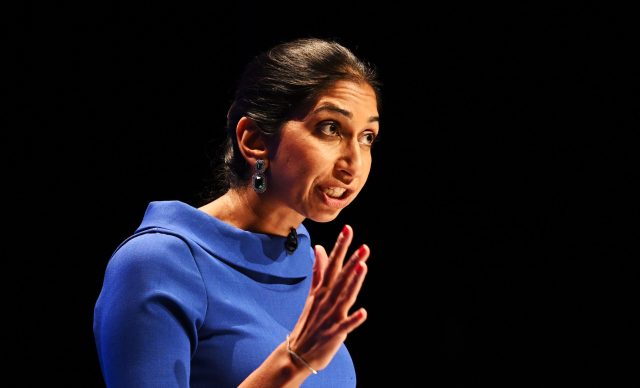How long will she last? (Leon Neal/Getty Images)

I almost feel sorry for Suella Braverman. One minute, the Home Secretary was living her best life, happily raging against “the tofu-eating wokerati”; the next, she was being blamed for a firebomb attack on a migrant centre in Dover, the latest chapter in Britain’s sorry immigration story. But amid the chaos, the combination of these flashpoints perfectly encapsulated everything wrong with the current immigration system: here we had yet another politician trying to appear tough on immigration while flailing incompetently, only to be followed by an outburst of hateful violence in response to their incompetence. And so the cycle continues.
Ever since Britain voted to leave the EU, countless politicians have tried to place immigration at the heart of public debate. Perhaps they think that tackling the issue is a guaranteed way to make their name and advance their career. What few realise, however, is that it is a career-killer.
What are we to make of this? Are we simply to conclude that immigration is an unsolvable problem, fated to forever curse Britain’s unfortunate Home Secretaries, from Jack Straw through to Braverman? It often seems that way. But such fatalism is not helpful. Immigration is a political problem like any other, and can be solved like any other, even if it happens to be a particularly tough one.
Perhaps the real challenge isn’t actually immigration itself, but a lack of political willpower. After all, the immigration issue is not going away any time soon. If anything, it is likely to get worse. Africa and the Middle East contain more than 1.5 billion people, many of whom live in areas rife with political instability and will be the hardest hit by the looming global economic recession related to the war in Ukraine. Nearly all these regions are on Europe’s periphery.
To put it simply, many, many more will likely make their way to Europe in the very near future. This will mean more political polarisation and extremism in Europe, as those frustrated by politicians’ failure to control their nation’s borders seek radical, even violent, solutions. If there has ever been a time to reverse decades of incompetence on immigration, it is surely now.
What, then, can be done? For a start, instead of hollow tough-talking and tinkering around the edges with frivolous, impractical plans like the Rwanda scheme, politicians need to address the underlying issues that have allowed this crisis to flourish. And the most obvious place to start would be completely replacing the underlying, outdated legislation that is at the root of so many of the UK and Europe’s immigration woes.
The UK, for instance, remains a signatory to the 1951 Convention Relating to the Status of Refugees, which, along with its 1967 Protocol, the UN’s refugee agency calls “the key legal documents that form the basis of our work”. What the UN fails to mention, however, is that its legislation dates from the Cold War, and was originally devised as a short-term Eurocentric solution to a post-war problem: to help those fleeing from the wrong side of the Iron Curtain. Its architects never envisioned a world of mass, global migration from poorer, less stable countries whose people follow very different cultural norms, many of which clash with modern Western values (women’s rights, for one). The 1951 Convention is, in other words, decades out-of-date. Its authors could never have conceived the scale of today’s migrant crisis.
Yet the 1951 Convention is just one example of international legislation hampering British attempts to control its borders. There are many others. As the Joint Committee on Human Rights found last year when examining a proposed bill to give the UK government more power to criminalise and turn back migrants crossing the Channel:
“As a signatory to international treaties governing maritime law, including the SOLAS and SAR conventions and the UN Convention on the Law of the Sea… the Joint Committee finds that Government proposals to ‘pushback’ migrants attempting to cross the Channel in small boats is likely to see the UK act in contravention of its international obligations.”
The bill passed, but as the above shows, it is unlikely to be effectively implemented. At present, then, it is impossible for the immigration crisis to be solved, for the simple reason that any effective new laws will clash with other legal obligations. Indeed, it is because of the UK’s membership in the European Convention on Human Rights that the Rwanda scheme failed: at the last minute, the ECHR ruled that the UK could not deport migrants to Rwanda. This is not to say that the Rwanda plan was a suitable solution, but rather that if progress is to be made, a fundamental conflict has to be resolved — and the only way to achieve this is for the UK to revisit its legal obligations and amend or even abandon them completely.
In today’s climate, of course, this will prove tricky, if not impossible. Braverman’s position is increasingly unstable: as last week’s attack in Dover demonstrated, she has lost control of her brief and shows little sign of regaining it. In the short term, at least, it is unlikely that she will have the parliamentary support to push through a complete overhaul of the UK’s legislative commitments. All of which means that Rishi Sunak has little choice but to step in. This is no longer a battle he can afford to delegate. For immigration is a career-killer — and if it’s not warded off soon, Braverman is unlikely to be its only victim.









